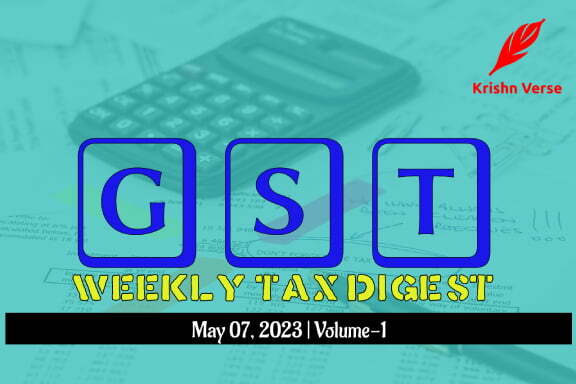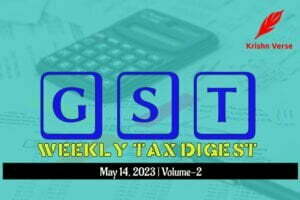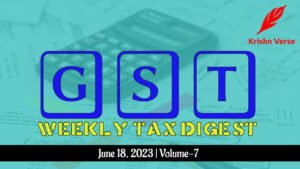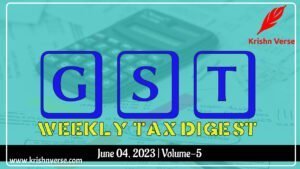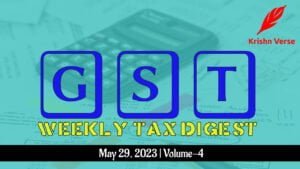Get ready for an informative read with the GST Weekly Digest May 2023 Vol-1! Stay up-to-date with the latest tax updates, news, and insights. This edition covers everything from the latest GST council meeting decisions to updates on GST returns, e-invoicing, and more. Keep yourself informed and ahead of the game with our weekly digest!
Digest Period: 29/04/2023 to 06/05/2023
GST – Saturday, 29th April, 2023
Introduction of Automated GST Return Scrutiny | Combat Fake Billing and Input Tax Credit (ITC) Fraud | Implementation of Feedback of Grievances Redressed | Revenue Achievement for FY 2022-23
Finance Minister Nirmala Sitharaman on Saturday, April 29, 2023 directed Central Borad of Indirect Taxes and Customs (CBIC) to introduce an automated GST Return Scrutiny and to implement an action plan to increase the taxpayer base by enhanced use of technology.
Sitharaman has instructed the CBIC to increase its efforts to combat fake billing and Input Tax Credit (ITC) fraud. As part of this initiative, CBIC will conduct a thorough analysis of previously identified cases to determine the root causes of the problem and develop technology-based solutions to prevent it from happening in the future.
The Finance Minister has emphasized the importance of improving the services provided to taxpayers, and has called for interactive sessions to be organized with members of the trade and industry in each zone who are part of the GST ecosystem. The aim of these sessions is to identify the concerns and suggestions of these stakeholders and to systematically work towards addressing them. In addition, the Finance Minister has directed the implementation of a system to gather feedback on grievances that have been addressed in order to improve the quality of redressal services provided.
The Finance Minister was updated on the final revenue achievement of total indirect tax collection for the fiscal year 2022-23, which totaled ₹13.82 lakh crore, an increase from the previous fiscal year’s collection of ₹12.89 lakh crore.
GST – Monday, 1st May, 2023
GST Revenue Collection for April 2023 highest ever at ₹1.87 lakh crore | 12% higher Y-o-Y |₹68,228 crore highest ever single day GST collection through 9.80 lakh transaction on 20th April, 2023.
April 2023 witnesses highest ever GST collection at ₹1.87 Lakh crore, growing by 12% compared to the previous year, according to the finance ministry. The CGST accounted for ₹38,440 crore, SGST for ₹47,412 crore, IGST for ₹89,158 crore (Including ₹34,972 crore collected on import of goods) and ces for ₹12,025 crore. This collection marks a new record for monthly GST revenue since the implementation of the indirect tax regime, surpassing the previous high of ₹1.68 lakh crore collected in April last year.
GST – Tuesday, 2nd May, 2023
Advisory for Document Reference Number (RFN) generation relating to GST by Odisha Government
On May 2nd, 2023, the Commissioner of CT & GST in the Odisha Finance Department, under the Government of Odisha, issued Notification No. 7451/CT&GST. This notification pertains to the generation of a Document Reference Number (RFN) for all communications from State Tax Officers to taxpayers and other relevant parties.
With reference to the direction received from the Supreme Court in its order No. W.P. (C) No. 320 of 2022 in the case of Pradeep Goyal Vs. Union of India and Others, the Odisha Finance Department has developed a facility for the generation of Document Reference Number (RFN). The objective behind this development is to promote transparency and accountability in the administration of Indirect Tax.
In accordance with the aforementioned notification, facility of generation of a Document Reference Number (RFN) has been made available on the GST back office for GST Tax Officers, as well as on the GST Portal. This feature can now be used by taxpayers and other concerned individuals to verify the authenticity of communications received from State Tax Officers, with or without login credentials.
Document Reference Number (RFN) for which documents? The facility of generation of RFN is for documents, notices, orders, intimations and other such documents of communication between GST Tax Officers and the taxpayers and other concerned persons relating to the administration of GST which are generated by GST Tax Officers using their Digital signature certificate or otherwise are generated with a unique reference number or ARN which is also printed and communicated on such documents.
How to verify Document Reference Number (RFN): Go to GST Common Portal >> navigating to Services >> User Services >> Verify RFN Option
GST – Thursday, 4th May, 2023
Ahmedabad Based OPL to launch GST Sahay application for Instant loan to MSMEs
The app is developed by Digital Credit Platform provider Online PSB Loans (OPL). This will benefit around 1.2 crore GST filing MSMEs to seek loans ranging from ₹10K to ₹2 Lakh
Jinand Shah, MD & CEO, Online PSB Loans said about the availability of loans by MSME. He told that to avail credit facility MSMEs have to comply certain conditions like to update their GST profile on app, update details regarding generated invoices etc. He added that this is the first kind of its product in the country that enables instance credit using GST profiles. He further said that, SIDBI is currently testing this app for their clients and expect a rollout in the first quarter of this fiscal. The rate of interest would ranging from 8 to 12 per cent.
Apart from MSMEs app will also being used for end-to-end digitization of Kisan Credit Card (KCC) in the state of Karnataka. This will reduce duration of availing credit from 3-4 weeks to just 5-10 minutes.
GST – Friday, 5th May, 2023
Stay Ahead of the Game: Plan Your GST Return Filing and Invoice Uploading to Avoid Last-Minute Rush, Advises GSTN
Take charge of your GST returns and avoid the last-minute rush! GSTN recommends adopting a month-wise filing discipline for all your B2B invoices. Don’t wait till the last moment to report past period invoices in one go, as this can clog up the queue and cause delays on the GST system.
The reason for GSTN issued advisory for filing GSTR to avoid last minute rush is that around 45 per cent of the returns filed on April 20 were either NIL returns (no tax liability and no ITC availment) or were such returns where no tax was paid in cash. The last day for filing tax returns for sales in March, resulted in a waiting queue on the GST system and causing inconvenience to some of the taxpayers.
It also highlighted that some taxpayers are uploading a large number of invoices (up to 27 lakhs) of the past period in one GSTR-1 on the due date of filing. Upon analyzing further it was noticed that a large number of taxpayers attempted to file GSTR-3B returns in the afternoon of the last day.
GSTN also advised taxpayers having “Nil” return not to wait till the last day and file return early before due date to avoid last minute rush. GSTN further advised to use SMS filing option to fil “Nil” returns for quicker and more convenient way. Return filing by SMS also help reducing queue on GST system.
Taxmen to conduct 2-month special drive to weed out fake GST registrations, identify masterminds
In an effort to curb fraudulent practices, GSTN has implemented a mechanism to identify suspicious GSTINs and will collaborate with State Central Tax administrations to verify and take necessary action against them. The recent National Coordination Meeting of State and Central GST officers on April 24 focused on this critical issue, highlighting the growing trend of unscrupulous elements misusing the identities of others to obtain fake, bogus registrations under GST.
Crafty criminals are taking advantage of fake or non-genuine registrations to unlawfully provide input tax credit (ITC) to dishonest beneficiaries by issuing invoices that have no connection to any actual supplies of goods or services.
In the world of Goods and Services Tax (GST), fraudulent registrations and bogus invoices have become a growing menace. These deceitful individuals engage in complex transactions and issue fake invoices, causing revenue loss to the government. The GST Policy wing of the CBIC has taken notice and warned of the gravity of this issue. To counteract this, the Central and State Tax administrations will launch a Special All-India Drive from 16th May 2023 to 15th July 2023.
The aim of this drive is to weed out fake billers from the GST eco-system and safeguard Government revenue. Currently, there are 1.39 crore taxpayers registered under GST. The identification of fraudulent GST identification numbers (GSTINs) will be based on detailed data analytics and risk parameters. GSTN will identify such fraudulent GSTINs and share the details of such suspicious GSTINs with the concerned State/Central Tax administration for initiating a verification drive and conducting necessary action subsequently. Let us work together to eradicate this threat and maintain the integrity of the GST system.
GST – Saturday, 6th May, 2023
Relief for Taxpayers: Time Limit for Reporting Old Invoices Deferred
On 13th April, 2023 The Government has announced the imposition of a time limit on reporting old invoices on the e-invoice IRP portals for taxpayers with AATO greater than or equal to 100 crores. To ensure timely compliance, taxpayers falling under this category will not be allowed to report invoices older than 7 days on the date of reporting, for all document types for which IRN is to be generated.
This restriction also applies to credit/debit notes that have been issued. The validation system built into the invoice registration portal will disallow the user from reporting the invoice after the 7-day window. However, taxpayers with AATO less than 100 crores are exempt from this restriction as of now. The limit of proposed was to be implemented from 01.05.2023 onwards.
The news of deferment has brought a sigh of relief for taxpayers with an aggregate turnover of more than 100 crores, who were anticipating the imposition of a time limit of 7 days on reporting old e-invoices. The decision to postpone the implementation of the new rule by three months was taken by the competent authority to provide sufficient time for taxpayers to adapt to the change and make necessary adjustments to their systems.
The deferment provides a much-needed buffer period for businesses to ensure that they comply with the new rule effectively without any disruption in their operations. The new deadline gives taxpayers some breathing space to restructure their systems and processes so that they can meet the requirements of the new rule. The announcement of deferment has been welcomed by taxpayers, who are relieved that they now have more time to prepare for the new regime.
So please await further instructions for the government regarding the next implementation date.
Disclaimer: We take utmost care to ensure that the information presented to you is accurate, reliable and sourced from credible resources. However, it is possible that some information may have been missed or may have changed since the time of publication. We apologize for any errors or omissions that may have inadvertently occurred. Please note that this article is for informational purposes only and should not be relied upon as professional advice. We strongly advise that you seek professional assistance before making any decisions based on the information presented here.
For more details on GST you may visit either of the website Press Information Bureau or Goods and Service Tax
Explore more details and articles related to Taxation News and Updates on our dedicated page created for the purpose. Click Here

